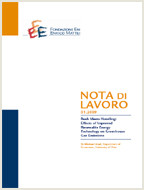Technology invention and diffusion in residential energy consumption. A stochastic frontier approach

22.11.2015
O33, Q55, Q41
Energy Efficiency, Technological Diffusion, Electrical Appliances, Stochastic Frontier Analysis, Residential Sector
Energy: Resources and Markets
Matteo Manera
Traditional large appliances absorb a large share of residential electricity consumption and represent important targets of energy policy strategies aimed at achieving energy security. Despite being characterized by rather mature technologies, this group of appliances still offers large potential in terms of efficiency gains due to their pervasive diffusion. In this paper we analyse the electricity consumption of a set of four traditional ‘white goods’ in a panel of ten EU countries observed over 21 years (1990-2010), with the aim of disentangling the amount of technical efficiency from the overall energy saving. The technical efficiency trend is modelled through a set of technology components representing both the invention and adoption process by means of specific patents weighted by production and bilateral import flows, which allows to overcome the rigid Stochastic Frontier framework in modelling the effect of technical change. Our results show that the derived energy demand and inefficiency trends are both related to changes in the amount of available technology embodied in energy efficient appliances. The effect is significant both in its domestic and international components and suggests an active role of innovation and trade policies for achieving efficiency targets which directly impact the amount of electricity consumed by households.
***
Suggested citation: Marin, G., A. Palma, (2015), ‘Technology Invention and Diffusion in Residential Energy Consumption. A Stochastic Frontier Approach’ , Nota di Lavoro 104.2015, Milan, Italy: Fondazione Eni Enrico Mattei
